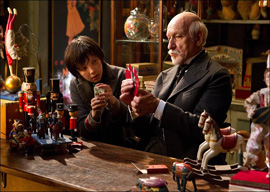
December 07, 2011

Obviously, you haven’t taken enough Film History 101 courses. Méliès (1861-1938) was a popular stage magician who began making movies in 1896. He shot 531 movies over the next 18 years, including the 1902 science-fiction film A Trip to the Moon. He invented many of the tricks of trick photography.
But then Méliès’s style fell out of fashion. He had to sell his film stock for recycling and was reduced to anonymity, which he bitterly resented. Scorsese’s new movie fearlessly tackles society’s most tragic problem: celebrities who become unpopular and have to get real jobs. Deep down, aren’t you discomfited, even horrified at the thought that anybody who was once somebody might have to take non-celebrity employment someday? Victorian housemaids felt the same way about duchesses.
Much to his delight, however, film archivists rediscovered Méliès in 1930. Hugo ends at a banquet in his honor as he becomes a film-school lecturer.
In Hugo, Méliès blames his decline on the Great War, but what really happened to him was D. W. Griffith. The American director figured out one trick that had completely eluded Méliès: What audiences like most are intercut close-ups of stars’ faces. Compared to human interaction, Méliès’s flatly photographed tableaus are so dull that not even the conjuring of Theresa Schoonmaker, Scorsese’s sensational editrix, can punch them up much. Film historian David Thomson concludes, “There is something wearying in all [Méliès’s] tricks, isolated as they are from meaning….”
Then again, Thomson’s Biographical Dictionary of Film speculates unsympathetically about Scorsese’s obsessions. Its entry on the Raging Bull director repeatedly hints that Scorsese is not only a sissy who doesn’t know anything about boxing but is also a flaming closet case with a crush on Robert De Niro. This allegation may (or, for all I know, may not) come as a surprise to the five women Scorsese has married.
This children’s film will impress everyone except children. Young folks assume that grownups are here to help them fulfill their dreams, but as Hugo patiently explains to the ungrateful little bastards, their duty is to make grownups’ ambitions come true—especially if the adult is a 69-year-old filmmaker and his desire is to garner yet another standing ovation from a crowd of film folk in formal attire, as Scorsese earned at the Oscars for The Departed.
In summary, Hugo is a very nice movie with something in it for everybody, but everything in it for Scorsese.